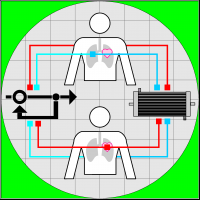ECLA-VENT
The acute respiratory syndrome (ARDS) is a life-threatening syndrome, which requires in severe cases the use of extracorporeal lung assist systems (ECLA). These ECLA systems support the damaged respiratory system via additional blood oxygenation (ECMO: extracorporal membrane oxygenation).
Since this method of treatment is cost-intensive and holds a high risk for complications, it is solely used as ultima ratio method. An automation of the therapy could increase its applicability significantly. Essential aspects would be the reduction of the workload of the staff and of the reaction time to complications. Additionally it allows a more elaborated treatment, for example by continuous adaption of the ventilation and oxygenation with respect to a patient-related strategy.
This motivation holds a range of topics for research, which are in the focus of the ECLA-VENT project. This project is part of the “Smart Life Support 2.0” framework, which is funded by the German Research Foundation (DFG).

Project Partners
Project Objectives
The main goal of our project is the reduction of the risk for patients and the optimization of the efficiency of the therapy by dynamical adaption of the treatment’s parameters. Therefore we develop in cooperation with our project partners a combined system for ventilation and oxygenation, which is based upon an intelligent embedded closed control loop.
In the focus of our project partners is the development of a cooperative closed control loop, which allows more complex strategies during the treatment and an improvement of the lung protection.
Our focus of research is the safety and reliability of the embedded system.
The interconnection of the closed-loop control and the physiology of the patient leads to a great number of nonlinear dependencies. Regarding to this additional safety demands must be considered and the potential of conflict of the safety goals must be analyzed. The safety mechanisms to fulfill these demands should not only restrict the system, but interact with respect to the needs of the patient.
The results of the previous project “SmartECLA” will be used as basis.
Overview:
- definition, verification and implementation of an overall safety concept with respect to the cooperative closed-loop control
- implementation of the ventilation into the present safety concept
- analysis of safety-critical states by hybrid system models
- structured evaluation of conflicts between safety goals by risk analysis
- development of conflict solving strategies
- formulation of a design pattern catalogue to assist closed-loop control development by defined interfaces
Publications
Publications written under the framework of the SmartECLA project